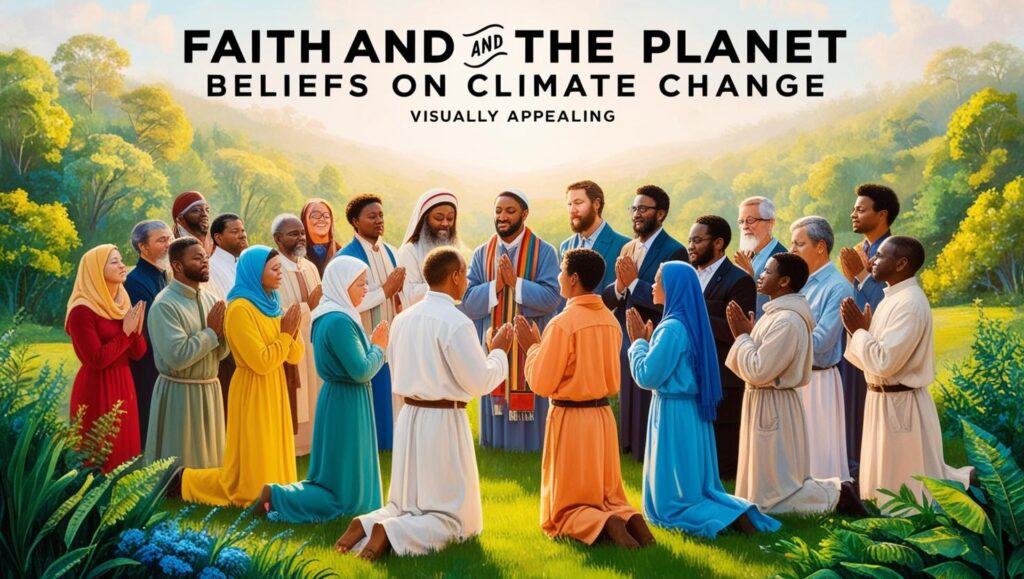Climate change is an issue that transcends borders, cultures, and ideologies, affecting everyone on the planet. Yet, the way people perceive this global challenge often varies significantly, influenced by a multitude of factors, including religious beliefs. These beliefs can shape attitudes toward environmental conservation and action, driving some to take meaningful steps to mitigate climate change, while others may adopt a more skeptical stance. In this article, we explore how religion can influence views on climate change and highlight the voices of faith leaders advocating for urgent action to protect our planet.
How Religion Shapes Views on Climate Change
Religion has long served as a guiding force in the lives of billions of people around the world, providing moral compasses and influencing daily decisions. When it comes to climate change, religious teachings can significantly shape how adherents perceive the urgency and legitimacy of the issue. For instance, many Christians interpret the biblical directive to “till and keep” the Earth as a call to stewardship, prompting them to advocate for sustainable practices. On the other hand, some religious groups may downplay human-induced climate change, viewing it as either a natural cycle or as part of a divine plan.
For some believers, the concept of environmental stewardship is deeply embedded in their faith traditions. In Islam, the term “khalifa” refers to being stewards of the Earth, entrusting Muslims with the responsibility to protect the environment. Similarly, Hinduism’s reverence for nature as sacred is reflected in its teachings, often encouraging followers to live in harmony with the natural world. This spiritual outlook can inspire individuals to engage in environmentally friendly practices, such as reducing waste and conserving resources.
However, there are religious communities that remain cautious or skeptical about the human role in climate change. This skepticism may stem from a perceived conflict between scientific findings and religious doctrines or from political influences within religious groups. This divergence highlights the complex interplay between faith and science, where interpretations vary widely even within the same religious tradition. As a result, efforts to address climate change through religious communities often require nuanced understanding and respectful dialogue.
Faith Leaders Speak Out to Save the Earth
Despite some skepticism, many faith leaders around the globe have become vocal advocates for action against climate change, recognizing that the environmental crisis poses a significant threat to humanity and creation. Pope Francis, for instance, has been a prominent voice in the Catholic Church, urging followers to care for the planet through his encyclical “Laudato Si'”. He emphasizes the moral obligation to address climate change, calling it a matter of existential importance for the poor and vulnerable populations.
Prominent figures in other faiths have also joined the call. The Dalai Lama, spiritual leader of Tibetan Buddhism, has consistently advocated for environmental responsibility, linking the health of the planet with the well-being of its inhabitants. He encourages not only Buddhists but people of all faiths to take action in reducing carbon footprints and promoting environmental awareness. His teachings remind us that the degradation of nature impacts us all, regardless of religious affiliation.
These leaders are not alone in their efforts; interfaith coalitions have emerged as a powerful force for environmental advocacy. Groups like the Interfaith Power & Light campaign work across religious lines to mobilize communities for climate action, emphasizing shared values of compassion and stewardship. By bringing together diverse voices, these coalitions aim to inspire collective action and foster a sense of global responsibility. Such initiatives highlight the potential for faith communities to drive meaningful progress in the fight against climate change.
As climate change continues to challenge our planet, the role of faith in shaping individual and collective responses becomes increasingly critical. While religious beliefs can influence perceptions and actions in varied ways, the growing engagement of faith leaders and communities underscores a universal truth: the need to protect our shared home transcends any single doctrine or creed. By drawing on the moral imperatives embedded within their traditions, people of faith have the opportunity to lead by example, promoting sustainable practices and advocating for policies that preserve the Earth for future generations. In a world that often feels divided, the shared responsibility of caring for our planet offers a powerful common ground for unity and action.


